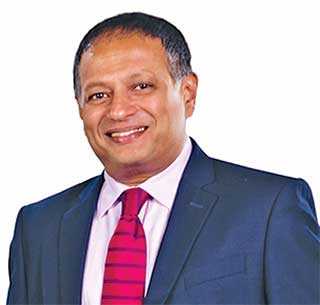Friday Feb 27, 2026
Friday Feb 27, 2026
Wednesday, 15 May 2019 02:43 - - {{hitsCtrl.values.hits}}
The National Development Bank PLC said yesterday it has recorded a pre-tax profit of Rs, 3 billion for Q1 2019 ended 31 March, a growth of 9% over Q1 2018.
The bank’s profit after tax of Rs. 1.4 billion was however, a 12% decline over Rs. 1.6 billion reported for the comparative period, due to higher taxes including the new Debt Repayment Levy and the impact from exchange losses incurred on the revaluation of the foreign currency reserves of the bank. The reported results are largely reflective of the subdued macroeconomic and industry conditions experienced during the first quarter of the year.
 |
Chairman Kavan Ratnayaka |
 |
Group Chief Executive Officer Dimantha Seneviratne |
Commenting on the quarter’s performance, the Group Chief Executive Officer of NDB Bank Dimantha Seneviratne mentioned that the bank saw a moderation in growth having accounted for the prevailing economic conditions and the industry-wide trends in escalating NPLs. Hence, the bank’s growth has been calibrated to match such conditions, and taken a cautious approach with sound risk management and credit underwriting practices, to ensure healthy and sustainable growth.
He also mentioned that NDB will focus on considerable internal integration during the year, wherein investments are planned in the core banking system as well as digital banking capabilities. The bank is also evaluating internal processes to introduce business process re-engineering [BPR] solutions to achieve leaner, speedier and more cost effective processes, with the ultimate intentions of achieving cost efficiencies and an enhanced customer experience. The bank will also focus on further strengthening the capital base via the infusion of both equity and debt capital, the effects of all of which will place NDB on a robust launch pad to achieve accelerated growth in 2020 and beyond, he further commented.
Analysis of financial performance:
Income
Gross income recorded an 18% growth to Rs. 14.1 billion from Rs. 11.9 billion in the corresponding quarter. Total operating income was Rs. 6.0 billion, and was strengthened by the robust growth in net interest income [NII] as well as net fee and commission income. NII was Rs. 4.7 billion for the quarter under review, an increase of 39% year-on-year [YoY]. Within NII, interest income grew by 29%, and interest expense increased by 24%. The bank’s Net Interest Margin [NIM] was 3.41%, compared to3.49% in Q1 2018. The high rates offered on deposits, particularly time deposits by both banks and non-banking financial institutions have resulted in higher interest costs. This is however expected to ease out with the measures taken by the Central Bank of Sri Lanka to introduce a cap on deposit interest rates.
Net fee and commission income grew by 22% to Rs. 864 million YoY, due to the expansion of fee generating business activities and volume growths. The bank’s net gains from financial investments was Rs. 62 million and was a decline of77% over the prior period due to the higher gains earned during the corresponding period. Other operating income also was contained to Rs. 44 million, given the exchange losses incurred on the revaluation of the foreign currency reserves of the Bank, due to the appreciation of the Sri Lankan Rupee in Q1 2019.
Total operating expenses
Total operating expenses increased by 16% to Rs. 2.2 billion in Q1 2019. Personnel expenses increased by 14% to Rs. 1.2 billion, reflecting the increase in the staff base over the year, mainly to support business expansions [Staff base: Q1 2018 - 2,331; Q1 2019 – 2,652]. Depreciation and amortisation increased by 30% to RS. 137 million, in line with the large investment initiatives taken by the bank, in expanding the branch network and enhancing digital offerings for a better customer experience. The branch network expanded from 107 in Q1 2018 to 110 in Q1 2019, including NDB NEOS, the fully digitised branch of NDB, whilst the Cash Recycle Machine network increased from 4 to 35 respectively.
Amidst such expenditure, the cost to income ratio improved to 37.28% for the period under review from 39.34% in end 2018, and is expected to remain at similar levels due to enhancement in revenue, and process and cost efficiencies expected as a result of the bank-wide BPR initiatives being carried out.
Impairment charges for loans and other losses
The Impairment charge for the quarter ended 31 March was Rs. 842 million, compared with Rs. 800 million of Q1 2018. The bank is mindful of the stresses experienced in the industry and is continuously reviewing the collection and recovery processes to minimise the high impairment loss effect to the bank.
Balance sheet growth and capital management
The quarter saw moderation in the business expansions of the bank. The total assets base of the bank grew by 2% over 31 December 2018 [year-to-date/ YTD] to reach Rs. 483 billion, a quantum growth of Rs. 9.7 billion. Balance sheet expansion was supported by the expansion of the loan book [net] by 2% to reach Rs. 351 billion, which translated to a growth of Rs. 6.7 billion. On an year-on-year basis [i.e. from 31 March 2018 to 31 March 2019], the total assets of the bank grew by 22%, whilst net loans grew by 24%. The gross non-performing loan [NPL] ratio was 3.37% in Q1 2019, a 52 bps increase from end 2018. This increase is a reflection of the wider trend in industry NPLS, as a result of the challenging conditions experienced in the country.
On the funding side, customer deposits reached Rs. 351 billion, with a moderated YTD growth of 1% [equivalent to Rs. 3.5 billion] and a year-on-year growth of 24%.
As a part of the bank’s capital augmentation plans, to meet the enhanced capital adequacy levels under Basel II guidelines, and to support the bank’s growing franchise, the bank issued 50 million Basel III compliant, listed rated unsecured and subordinated debentures with a par value of Rs. 100/- and a tenor of five years in March 2019, which was oversubscribed and raised Rs. 5.561 billion as Tier II capital. The Tier 1 and total capital adequacy ratios of the bank as of 31 March [minimum requirements of which are 8.5% and 12.5%] were 9.34% and 14.40% respectively. The same ratios for the NDB Group were 10.61% 15.39%, affirming NDB’s strong capital position. In February 2019, Fitch Ratings Lanka Limited affirmed NDB’s credit rating at A+, whilst the Outlook was revised from Stable to Negative, given continuous pressure on capitalisation. The bank’s capital augmentation plan, which is a key strategic priority is currently underway, and will ensure the infusion of sound equity and debt capital to further strengthen the overall capital position.
Investor returns
The bank generated a return on shareholder funds [ROE] of 11.06% for Q1 2019. Earnings per share for the quarter was Rs. 17.52 whilst the closing share price was Rs. 94.20 as of 31 March.
NDB is on the trajectory to attain the status of a Domestic – Systemically important Bank in Sri Lanka with an asset base of Rs. 500 billion, under the midterm strategy – Transformation 2020. There is clear indication that the bank will achieve this goal well before the set timeline of 2020.
Q1 2019 was also notable for many awards the NDB Bank and the Group Companies won, including being chosen as the Best Domestic Bank Sri Lanka and the Best Investment Bank Sri Lanka [third consecutive year] 2019 by the Asia Money Magazine and Best SME Bank Sri Lanka 2019 [third consecutive year] by the Global Banking and Finance Review of the UK.